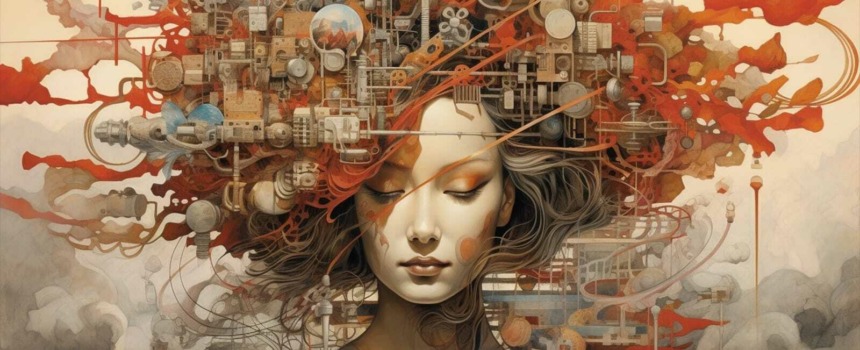Tempus Fugit.
That’s the Latin phrase for “time flies.” With the incredibly rapid changes occurring today, this has never been more obvious. As front-and-center evidence, artificial intelligence is now very much with us, constantly in our minds and the media. The old world has long gone past. The new world is now entirely in place.
Dealing with the unimaginable complexity of these constant changes requires a different kind of thinking than that of the past. We must move out of traditional linear thinking to holistic thinking. Holistic thinking opens our minds to connections not made in the past, making it possible to accept new factors. We must accept the world’s interconnectedness—and, indeed, that of the universe itself.
How complex is today’s world? You can get lost in something as simple as an automobile. In my youth, I could make simple repairs to my own car. Today I drive a Lincoln SUV that is so complex that, if anything goes wrong, I can only bring it to professionals. It requires an expert to work on it.
Cybernetics
Today’s world requires a new navigation system. For that reason, the approach we have brought into our company is cybernetics. Cybernetics is not just a nice idea. It is the reality required to sift through the massive amount of data available today.
Anything that can be digitized will be digitized, and we’ve reached the point today that, for the first time, we can instantly search through all of history’s data right at our fingertips. In past times such searching required trips through the libraries, making one’s way through the stacks, retrieving books or other publications, and then pouring through each of them.
Next Level
It is learning to navigate these crazy times that will allow us, in my opinion, to get to the next level. We could leave behind the old mindset of creating war, the need for more tanks, rockets, and planes, and the “requirement” of firing increasingly powerful weapons at each other. Those that continue to lead us in that direction are still thinking linearly and have espoused error-ridden ideologies.
At Pipeliner, we have created a motto by which we operate: “Win together.” This is how we, as a world, must proceed forward. We all live together on this tiny blue dot, photographed by the first Voyager probe as it exited our solar system in 1993.

This tiny dot is part of a solar system that is only one of hundreds of billions of solar systems throughout the universe.
I recently flew from Washington, D.C. to Los Angeles, and could observe the country as we crossed it. The amazing thing was that most of this five-hour flight was spent over open country. There is an enormous amount of space left just in the U.S. There is much room to create something beautiful, like has been done in the United Arab Emirates desert with Dubai. In other words, we could still make plenty of positive changes on our little blue dot.
Defining Complexity
So just what does all this complexity mean? Complexity means “multiple options.” These multiple options are measured through variety—the number of different states a system can assume and create. Complexity is the dynamic diversity that constantly changes. It is one of most fundamental characteristics of reality.
Cybernetics pioneer Ross Ashby stated, “For a system to be stable, the number of states that its control mechanism is capable of attaining (its variety) must be greater than or equal to the number of states in the system being controlled.” Put simply, only variety can control variety. This statement is known as Ashby’s Law of Requisite Variety.
Variety controls variety through interdependent networks. As a simple example, I currently have back problems. They came about from overwork in my garden and playing basketball with my son. My body, in its interdependent complexity, is reacting with back issues.
Just as with the network between parts of the body, we see the results of increasingly intense networks between people, companies, organizations, countries, and systems. All of these systems are interdependent, which is where complexity lies. We are now entering AI, and complexity will only increase.
Controlling Complexity
People today complain about complexity, saying it must be reduced and made simple. In actuality, though, this is going backward. Could we, for example, reduce the complexity of solar systems? There are 163 billion of them. Could we reduce the complexity of the Sun’s gravitational control of the Earth?
In another example, my son currently has Crohn’s disease. It is a very complex disease—we cannot see it, but it affects his body, specifically his colon. And how complex is the colon? We intake food, and it runs through our digestive system, and all value to our bodies is removed from the food, and the body then excretes waste. If that is not a complex system, then what is?
Could we reduce the complexity of the body? Doing so might be dangerous, as we might do away with one or more of the body’s digestive capabilities. In a way, we have done this today by creating artificial food, ignoring millions of years of nature’s creation of the food we need. This has resulted in the highest-ever rates of obesity in the U.S.
How, then, can we make systems controllable? They’re certainly out of control today. Just in the world of commerce, many companies can no longer handle the problems they face, with increasingly stiff competition. Such control requires cybernetic principles. Another cybernetics pioneer, Stafford Beer, stated that a system must be organized in such a way that it will organize itself.
We can see today that our systems are not functioning properly—and this includes society. A non-functioning society impacts its members. These members, these people, work within a company. When people inhabit non-functioning families, neighborhoods, or communities, they will undoubtedly be affected on the job, and the company itself will be affected.
The bottom line: We must learn that we cannot reduce complexity. We must approach today’s complex world with a different way of thinking.





















Comments